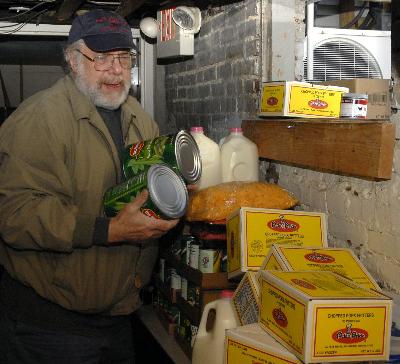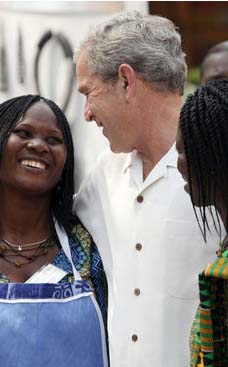
After getting his master's degree in 1963, Sofranko was talking with friends about what a "boondoggle" the Peace Corps was. Then he decided to join: "If I don't do something, I'm going to die here." In Nigeria, he taught high school physics and chemistry at a rural boarding school with no electricity or running water. He helped the students raise vegetables and poultry to sell at the town market. "They were really good years," he said, but also "terribly, terribly difficult at times." When rainy season arrived, mildew and fungi covered the walls, and the ground turned into 6 inches of muck. "You really appreciated what little you had," he said. "You become someone you weren't, but you have it in you all the time." His future wife, Dolores, who's from Elmira, N.Y., worked about 150 miles away in the bush. Sofranko would hitchhike or take his scooter to visit her. Stopping at a local cafe one day, Sofranko saw a catalog for Penn State. He flipped it open and saw an ad for a program in agricultural economics and rural sociology. "I thought, 'That sounds like what I'm doing here,'" he said. He wrote a letter, and was accepted. He got married, had a son, Christiaan, earned his doctorate and followed another Penn State faculty member to Illinois in 1970.
Nigeria RPCV Andrew Sofranko retires from University of Illinois
After years of travels, retired UI professor keeps on moving
By Julie Wurth
Sunday, April 20, 2008 9:22 AM CDT
Caption:
Retired Professor Andrew Sofranko unloads groceries at Catholic Worker House after a shopping trip. By Vanda Bidwell
CHAMPAIGN – Say, at age 18, Andrew Sofranko could see 50 years into his future. He might have said, "No thanks."
A coal-miner's son, Sofranko had no inkling he would:
Advertisement
a) Join the Peace Corps, work in Nigeria and marry a fellow volunteer.
b) Raise two Amerasian children from Vietnam.
c) Become a university professor and make friends around the globe.
"My first thought would have been, 'Oh no, that seems awfully complicated,'" he said.
Now a retired University of Illinois rural sociologist, the affable Sofranko, 68, has worked on development projects in Rwanda, Nepal and other exotic locales, as well as studying rural communities at home.
His roots were much simpler.
He grew up in tiny Connellsville, Pa., a town of about 2,000 people 35 miles south of Pittsburgh. His grandfather, a Czech immigrant, died in the mines. Sofranko's father was a coal miner for 28 years, starting at age 10 when he guarded his father's coal wagon.
Though "very intelligent," neither of Sofranko's parents finished high school. His father, Andrew, could speak Czech, Hungarian and Polish but had a third-grade education. His mother, Mary, had to quit school in ninth grade to work in a factory so her brothers could finish school.
She got her GED at age 57, with help from her college-age children. There was never any question they would go to college. It was either that, she told them, or the Army: "If you want to get ahead in life, you have to go to the city, you have to go to college."
Sofranko didn't embrace the idea right away. He applied for a job as an apprentice at his dad's factory. But the interviewer refused to give it to him, saying, "Go to college."
Sofranko went to nearby St. Vincent's College in Latrobe, Pa., earning a degree in psychology and sociology. From his classroom, he could see the airstrip where golfer Arnold Palmer landed his private plane near the country club. He worked his way through college, commuting from home and working nights at a supermarket.
With no real job prospects, Sofranko "took the easy way out" and went on to graduate school 40 miles away at West Virginia University, earning a master's in industrial relations. As part of a worker-retraining project in Appalachia, he traveled up and down the state interviewing more than 1,500 displaced coal miners.
"It was really interesting," he said. "Some of these people literally scared the daylights out of you."
One interview stands out. In Huntington, W.Va., his subject had moved away, but the man's elderly mother was home. She spent three hours telling Sofranko her life story, even fixing him breakfast.
A week later, the university president called Sofranko, saying he'd gotten a letter from the woman. She wrote, "Don't ever send anybody out to my house again. He sat here for three hours and I couldn't get anything done."
Sofranko's life spills out in anecdotes. A natural storyteller like his father, he relates to people from all walks of life.
"I love to talk to people. It's really all I've done all my life," he says. "Everyone has an interesting story to tell, or wants to hear an interesting story."
Take the Peace Corps stint. After getting his master's degree in 1963, Sofranko was talking with friends about what a "boondoggle" the Peace Corps was. Then he decided to join: "If I don't do something, I'm going to die here."
In Nigeria, he taught high school physics and chemistry at a rural boarding school with no electricity or running water. He helped the students raise vegetables and poultry to sell at the town market.
"They were really good years," he said, but also "terribly, terribly difficult at times."
When rainy season arrived, mildew and fungi covered the walls, and the ground turned into 6 inches of muck.
"You really appreciated what little you had," he said. "You become someone you weren't, but you have it in you all the time."
His future wife, Dolores, who's from Elmira, N.Y., worked about 150 miles away in the bush. Sofranko would hitchhike or take his scooter to visit her.
Stopping at a local cafe one day, Sofranko saw a catalog for Penn State. He flipped it open and saw an ad for a program in agricultural economics and rural sociology.
"I thought, 'That sounds like what I'm doing here,'" he said.
He wrote a letter, and was accepted. He got married, had a son, Christiaan, earned his doctorate and followed another Penn State faculty member to Illinois in 1970.
The Sofrankos later added three more children: Matthew, adopted at age 5, who now lives in Belleville; and two foster daughters, Minh and Linh, who joined the family in 1984.
The girls, whose father was American and mother was Vietnamese, left Vietnam on a boat at ages 9 and 12, wound up in a Thai refugee camp and eventually made their way to the United States. They landed at Catholic Charities in Peoria, where Dolores worked. She talked to her husband, and they decided to take the girls in.
"That was really one of the smartest moves we ever made," Sofranko said.
The girls are now raising their own families and recently brought their Vietnamese mother to live in Champaign.
"It hasn't all been easy, but it has all worked out," Sofranko said. "The grandkids say, 'We have three grandmothers.'"
Pondering retirement a few years ago, Sofranko was determined to follow his father's example. Andrew Sr. retired in his late 60s and "never, ever sat still." He won awards for volunteering at nursing homes, had a garden, raised rabbits, attended daily Mass and helped his children with home-improvement projects. He lived to be 83.
Sofranko is now a regular volunteer at Habitat for Humanity's ReStore and St. Jude Catholic Worker House, where he shops for groceries each week and cooks chili or spaghetti for the soup kitchen.
"He has a wonderful personality. Whatever you ask him, there's never any grumbling. He's just a good all-around guy," volunteer Madeleine Schweighart said.
After a career at the UI, where he worked with a much narrower slice of life, Sofranko enjoys meeting people "from the brilliant and crazy to the criminal," as he puts it. "It's the real world."








